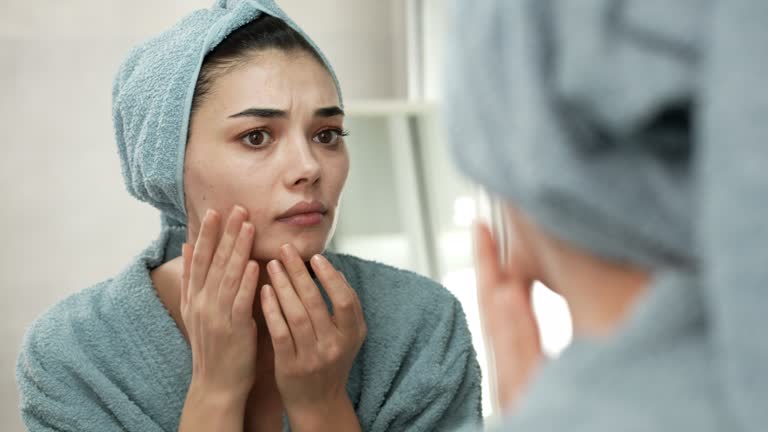The Influence of Environmental Factors on Skin: Essential Insights for Beauticians
The influence of environmental factors on skin is a crucial subject, particularly for beauticians who play a key role in skincare. Our skin, being the body's largest organ, serves as a protective shield against outside forces. However, this shield faces challenges from various environmental elements. By understanding these challenges, beauticians can offer improved care and guidance to their clients.

Effects of Weather and Climate
Weather and climate have a profound effect on skin health. Extreme weather events, such as frigid winters or blistering summers, can strip the skin of its natural moisture, leading to dryness and irritation. Cold, arid air can deplete the skin's natural oils, while high heat and humidity can boost oil production, resulting in acne flare-ups.
Cold Weather Considerations
The cold season can be particularly tough on the skin. Beauticians should recommend the use of richer moisturizers during winter to safeguard the skins moisture barrier. Products with hyaluronic acid and glycerin can be advantageous.
Hot Weather Challenges
Conversely, hot weather tends to increase perspiration, which can block pores and cause breakouts. Beauticians should advise clients to opt for lightweight, non-comedogenic moisturizers and sunscreens to maintain clear skin. Regular exfoliation can also prevent pore blockages.
Impact of Pollution and Toxins
Urban settings expose the skin to contaminants and toxins that can speed up aging and provoke inflammation. Air pollution can result in oxidative stress, leading to dull, fatigued skin and increased sensitivity.
Addressing Pollution Effects
Beauticians can support clients in fighting pollution's impact by suggesting antioxidants such as vitamins C and E, which help neutralize free radicals. Furthermore, implementing thorough cleansing routines is vital for removing dirt and pollutants from the skin's surface. For more detailed skincare tips, check out our guide on everyday acne prevention.
The Role of Ultraviolet (UV) Radiation
UV radiation from sunlight is among the most recognized environmental influences on the skin. Extended exposure to UV rays can lead to sunburns, premature aging, and heightened skin cancer risks. Incorporating sunscreen into any skincare routine is essential.
Selecting the Right Sunscreen
Beauticians should assist clients in choosing a broad-spectrum sunscreen with a minimum SPF of 30. It's vital to emphasize daily use, even on overcast days, to ensure comprehensive protection. For further information on sunscreen options, refer to the Health Direct site.
The Dual Nature of Humidity
Humidity levels can also affect skin health. High humidity may lead to excessive oil production and acne, while low humidity can cause the skin to become dry and flaky. Beauticians ought to account for local climate conditions when advising clients on skincare products and practices.
Managing Humidity Levels
In humid regions, lightweight moisturizers and routine cleansing can help manage oiliness. Conversely, in dry climates, heavier moisturizers and hydrating serums are essential for locking in moisture.
Indoor Environmental Considerations
Indoor environments can also impact skin health. Air conditioning and heating systems often reduce humidity, resulting in dry skin. Beauticians should recommend utilizing humidifiers to sustain optimal indoor humidity levels. Furthermore, encouraging clients to stay hydrated with adequate water intake is vital for skin health.
Skincare Tips for Indoor Environments
Advising clients to develop a skincare routine that addresses indoor environmental factors can help maintain skin hydration and balance.
Conclusion
Grasping the influence of environmental factors on skin is essential for beauticians dedicated to providing thorough skincare advice. By examining the effects of weather, pollution, UV rays, and indoor conditions, beauticians can assist clients in achieving healthy, glowing skin. To explore more about skin health, visit the American Academy of Dermatology.

FAQs
1. How do environmental changes impact various skin types?
Environmental shifts can influence skin types in different ways. For example, oily skin may become more susceptible to acne in humid environments, whereas dry skin may only become drier in cold, arid climates.
2. What function do antioxidants serve in skin protection?
Antioxidants are crucial for skin protection, as they neutralize free radicals generated by environmental factors like pollution and UV exposure. They help mitigate oxidative stress and minimize signs of aging.
3. Can diet affect how skin reacts to environmental factors?
Indeed, a well-balanced diet enriched with vitamins and minerals can enhance the skin's resilience against environmental factors. Foods abundant in antioxidants, omega-3 fatty acids, and essential vitamins can bolster skin health.

